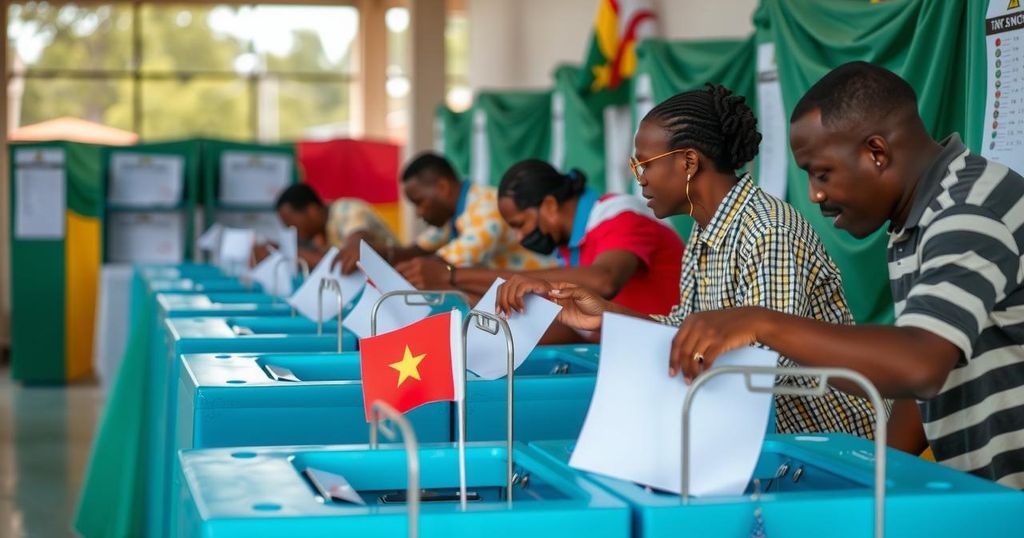Ghana’s General Election: A Crucial Test Amid Economic Turmoil
Polling stations opened in Ghana as voters confront a dire economic crisis, participating in presidential and legislative elections. The primary candidates, Vice President Mahamudu Bawumia and former President John Mahama, offer limited promise for change. The elections reflect a democratic testing ground amid widespread discontent, with prior successes now overshadowed by inflation, unemployment, and issues like illegal mining threatening the nation’s recovery.
The general election in Ghana commenced on Saturday, overshadowed by the nation’s significant economic turmoil. Approximately 18.7 million registered voters are participating in a critical presidential and legislative election, seen as a referendum on democracy in a region facing political instability. Despite the historical precedence of Ghana as a stable democratic nation, the current economic crisis raises skepticism regarding any real change offered by the two primary candidates.
The election unfolds amid a country that once stood as a model of democracy and economic progress. Ghana faces alarming inflation and rising unemployment, creating a disenchanted electorate. A recent Afrobarometer poll indicated that 82% of Ghanaians perceive the country as heading in the wrong direction. The election features twelve candidates, yet it has devolved into a traditional two-horse race.
Vice President Mahamudu Bawumia of the ruling New Patriotic Party (NPP) competes against former President John Dramani Mahama of the National Democratic Congress (NDC). While the NPP attempts to claim credit for its economic policies, it struggles amid a lingering crisis, while Mahama, who previously was ousted over unfulfilled pledges, promises a comprehensive national reset.
Furthermore, the election encompasses the selection of 276 parliamentary members, with the current balance of power evenly split between the two dominant parties, necessitating contentious negotiations in government. Both candidates concluded their campaigning with fervent promises targeting the economic malaise, striving to present their parties as viable solutions.
Public sentiment across Accra reflects a complex duality, combining enthusiasm for the electoral process with cautious anxiety over the pressing economic problems. The nation’s inflation peaked at 54% last year, and a continuing default on foreign debts has exacerbated the plight of citizens. Additionally, the ongoing battle against illegal gold mining remains a significant electoral issue, presenting environmental and economic dilemmas.
As Ghana approaches this pivotal election, the collective hope for recovery must contend with the realities of economic strain and public sentiment regarding the efficacy of its leaders.
The significance of the general election in Ghana is attributed to the country’s historical role as a model of democracy in West Africa, particularly during a time of regional instability marked by coups and extremism. Hugely impacted by an economic crisis, Ghanaians now confront rising inflation and unemployment rates, leading to a general sense of pessimism about leadership options. Historical perspectives regarding Ghana’s economic performance juxtaposed with its current challenges provide a critical backdrop to the electoral proceedings, which promise to reflect the collective sentiment of a disenfranchised populace.
In conclusion, the Ghanaian general election is a vital moment for the country, reflecting both the resilience of its democratic principles and the harsh realities of an economic crisis that has destabilized the lives of its citizens. With a clear split between the main political parties and scant differing economic proposals, the outcome of this election will be crucial in determining the future course of Ghana’s governance and economic recovery efforts. The stakes are indeed high for a nation seeking to regain its former status as a beacon of democracy and prosperity in Africa.
Original Source: www.newsday.com




Post Comment